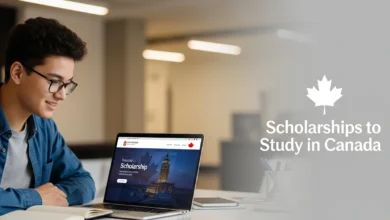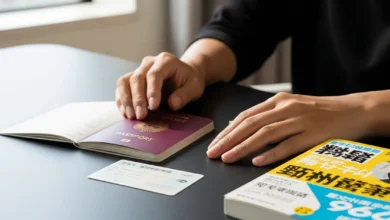What type of questions are asked in a student visa interview?

So, you’ve done it. You’ve successfully navigated the complex world of university applications, secured an offer from your dream institution abroad, and now only one hurdle remains: the student visa interview. For many, this is undoubtedly the most nerve-wracking part of the entire process. In fact, the thought of sitting opposite a consular officer, who holds the key to your future, can be incredibly intimidating. You are likely wondering, “What will they ask me? What are they looking for?”
Relax. This guide is here to demystify the process. A student visa interview isn’t designed to trick you. On the contrary, its purpose is straightforward: to verify that you are a genuine student with a clear plan, sufficient funds, and, crucially, the intention to return home after your studies. For this reason, understanding the logic behind the questions is the first step to answering them with confidence.
Let’s break down the different categories of questions you can expect and, subsequently, how to prepare for them effectively.
1. Questions About Your Choice of Study and Academic Background
First and foremost, the officer needs to believe that your primary purpose for traveling is education. Therefore, they want to see a clear and logical connection between your past studies, your proposed course, and your future career goals.
Articulating Your Course Choice
- Common Question: Why did you choose this specific course?
- The Intent: The officer is checking if you have done your research and have a genuine academic interest. Consequently, a vague answer like “It looked interesting” simply won’t cut it.
- How to Answer: You must be specific. Talk about particular modules, research opportunities, or faculty members that attracted you. Furthermore, explain how this course builds upon your previous education and aligns with your career aspirations. For instance, “I chose the Master’s in Data Science at XYZ University specifically because of its focus on machine learning algorithms. This directly relates to my final year project in my computer science undergraduate degree and, moreover, supports my goal of becoming a data analyst in the tech sector back home.”
Connecting to Your Academic Past
- Common Question: What do you know about your course curriculum?
- The Intent: This question directly tests how serious you are. After all, a genuine student will have thoroughly researched what they are going to study for the next few years.
- How to Answer: You should mention a few core modules or electives that you are particularly excited about. This clearly shows you’ve gone beyond just reading the course title on the university website.
- Common Question: Can you tell me about your previous academic qualifications?
- The Intent: This is a straightforward verification of your academic history.
- How to Answer: State your previous degree, the institution you attended, your graduation date, and your final grade or GPA. Also, be prepared to discuss your final year project or dissertation if asked.
2. Questions About Your Choice of University and Country
Why this specific university? Similarly, why this country? The visa officer wants to ensure your choice is well-reasoned and not just a random attempt to enter the country for other purposes.
Justifying Your Destination
- Common Question: Why did you choose to study in [e.g., the USA, UK, Canada]?
- The Intent: The officer wants to see that you have a valid reason for choosing their country’s education system over your own or others.
- How to Answer: Above all, focus on the academic strengths. For example, you could mention the quality of education, research facilities, global recognition of degrees from that country, or a specific teaching methodology. It’s best to avoid answers like “I like the lifestyle” or “I have family there.”
Explaining Your University Selection
- Common Question: Why did you select this particular university? How many universities did you apply to?
- The Intent: This question assesses your decision-making process. Applying to only one university might seem suspicious; however, applying to dozens without a clear strategy might suggest you’re desperate.
- How to Answer: The key here is to be honest. It’s perfectly fine to say you applied to 4-5 universities. Then, explain why you ultimately chose this one. You could mention its ranking for your specific course, its research output, faculty expertise, or unique campus facilities. For example: “I applied to five universities known for their strong engineering programs. Ultimately, I chose ABC University because its robotics lab is one of the best in the country. In addition, Professor Jane Doe, whose work I’ve followed, is a leading researcher in my field of interest.”
3. Questions About Your Financial Situation
This is a critical part of the interview. In short, the officer must be completely convinced that you or your sponsor can cover your tuition fees and living expenses for the entire duration of your stay without you needing to work illegally or rely on public funds.
Clearly Explaining Your Sponsorship
- Common Question: Who is sponsoring your education? What is their profession and annual income?
- The Intent: This is to verify the legitimacy and financial capacity of your sponsor.
- How to Answer: State your sponsor’s name, their relationship to you (e.g., “My father, Mr. John Smith”), their job title, the company they work for, and their annual income. Crucially, you must have official documents (bank statements, tax returns, employment letters) to back this up. Be confident and clear.
Presenting a Solid Financial Plan
- Common Question: How will you pay for your tuition fees and living expenses?
- The Intent: A direct question about your financial plan.
- How to Answer: Break it down clearly. For example, “My father is my sponsor. He has saved a dedicated amount for my education, which is shown in the bank statements I have provided. Consequently, the total funds available are $X, which comfortably covers my first year’s tuition of $Y and estimated living costs of $Z, with sufficient funds for subsequent years.”
- Common Question: Do you have an education loan?
- The Intent: To get a full picture of your funding.
- How to Answer: If you have one, say yes and have the sanction letter ready. Explain the loan amount and terms. In fact, an education loan from a reputable bank can actually strengthen your application, as it shows the bank has assessed your (and your family’s) credibility.
4. Questions About Your Future Plans and Ties to Your Home Country
This is perhaps the most important category of all. Most student visas are temporary, non-immigrant visas. As a result, you must convince the officer that you intend to return to your home country after completing your studies.
Defining Your Post-Graduation Career Path
- Common Question: What are your plans after graduation?
- The Intent: This is the key question to assess your non-immigrant intent. Your answer is therefore vital.
- How to Answer: Your response must demonstrate a clear and compelling plan to return home. Talk about specific job opportunities in your home country that your new degree will open up for you. For instance, mention companies you’d like to work for or the growing industry sector you plan to join. “After completing my Master’s in Renewable Energy, I plan to return to my home, Bangladesh. The government is heavily investing in sustainable energy projects, and consequently, companies like Grameen Shakti and IDCOL are expanding rapidly. With this international degree, I’ll be well-positioned to secure a senior project manager role there.”
Proving Your Intent to Return
- Common Question: What ties do you have to your home country?
- The Intent: The officer wants to see what strong reasons you have to come back.
- How to Answer: Think about financial, family, and professional ties. Specifically, mention your immediate family (parents, siblings), property or assets in your name or your family’s name, and the strong job prospects you have upon your return.
- Common Question: Do you intend to stay in [the destination country] after your studies?
- The Intent: A direct test of your intentions.
- How to Answer: The answer should be a firm and clear “No.” Then, immediately reiterate your plans to return home and build your career there. Explain why returning is beneficial for you. “No, my long-term plan is to build my career back home. All of my family is there, and besides that, the professional opportunities in my field are growing significantly.”
Final Tips for Success
- Be Confident, Not Arrogant: First, maintain eye contact, speak clearly, and be polite. Your body language definitely matters.
- Be Honest: Second, never provide false information or fake documents. Consular officers are highly trained to spot inconsistencies.
- Be Concise: In addition, answer the question that is asked. Don’t ramble or provide unnecessary information.
- Know Your Documents: Furthermore, be intimately familiar with every detail in your application and supporting documents.
- Dress Professionally: Finally, dress in clean, smart casuals or formal attire. First impressions count.
The student visa interview is the final checkpoint on your journey to studying abroad. By understanding what type of questions are asked in a student visa interview and preparing your answers thoughtfully, you can walk into that room with confidence and, as a result, turn your academic dreams into reality. Good luck!
Disclaimer
The content in this guide is based on common student experiences and is intended for informational purposes only. It does not constitute legal or professional immigration advice. Visa procedures, requirements, and interview questions are subject to change without notice and can differ between countries and individual consular officers.
Edqty assumes no liability for any inaccuracies or for the outcome of your interview based on this information. Your reliance on any information provided in this article is solely at your own risk. We strongly urge you to consult the official government website and the specific embassy or consulate for the most accurate and up-to-date requirements.




